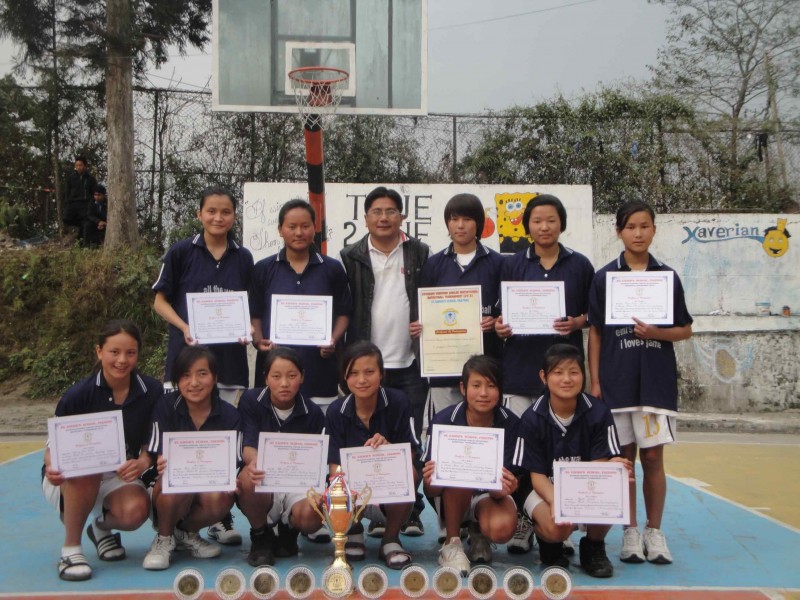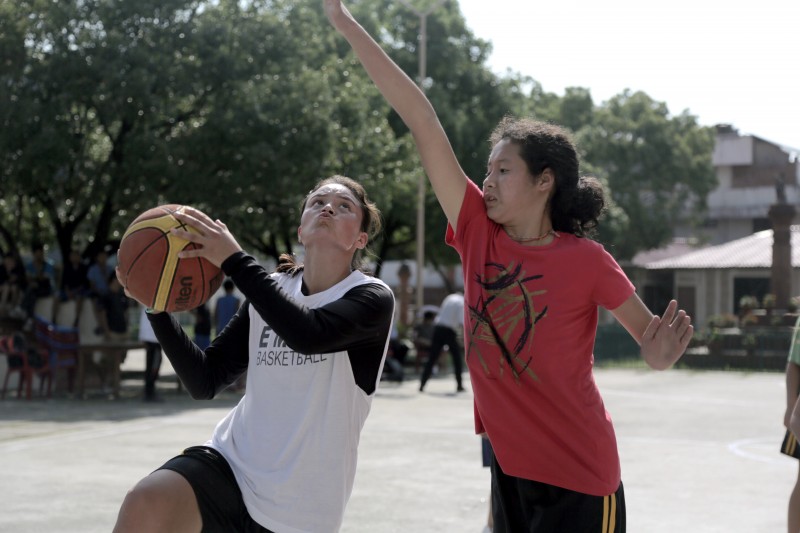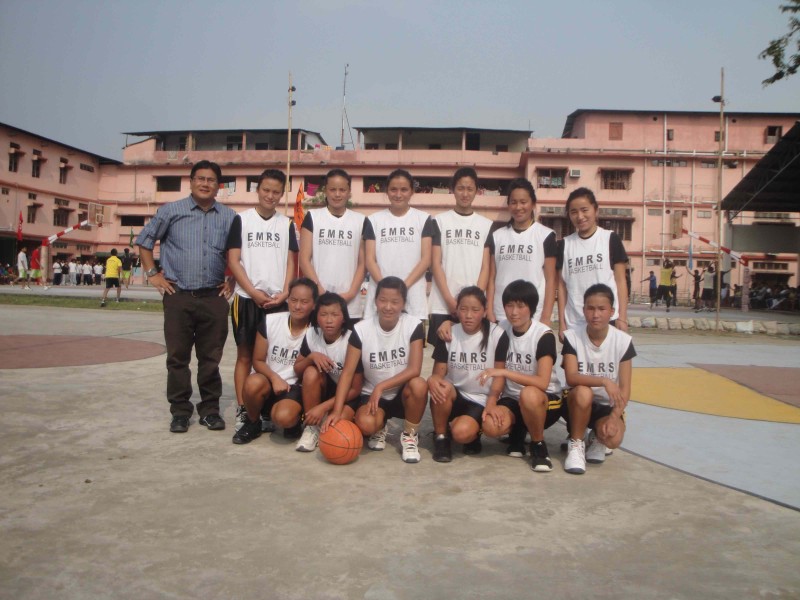 |
| The champions - girls basketball team of Gangyap's Ekalavya Model Residential School, Sikkim, with their coach. Image used with permission. |
Gangyap is a remote mountainous village, located at an altitude of 6,500 feet in the Himalayan mountains of Western Sikkim. Over the last few years, the village has come out of the shadows, thanks to a group of its teenage girls who, under the guidance of their school principal-cum-coach, has become an unlikely powerhouse in the Indian under-19 CBSE (Central Board of Secondary Education) Basketball league.
Siddharth Yonzone, 37, was appointed the first principal of the Eklavya Eklavya Model Residential School (EMRS) for Scheduled Tribes that opened in Gangyap around 2009 and he recalls that at the time, the school wasn't connected by proper roads and there were no proper school building or playground. Yonzone introduced basketball to the small number of students (52 enrolled in the first year, and 33 passed) as an extra-curricular student activity and became their coach and mentor.
At Gangyap, few had heard of basketball before, but that did not deter Yonzone, himself a basketball fan. There were many challenges, but the fledgeling team and their coach persevered. This video by documentary filmmaker Mandira Chhetri explains how the girls had to build their own basketball court from scratch, through manual labour:
Despite the challenges, however, the girls basketball team of Gangyap started playing in the championships in 2010 and surprised everyone when they stole the headlines in 2011 by winning the under-19 CBSE Basketball national level championship, the first team from north-east India to do so. The girls team has lifted the East Zone trophy for the fifth time this year and are currently preparing to take part in the 2014 under-19 national championships, to be held in December.
 |
| The girls of Gangyap in action. Image used with permission. |
Global Voices (GV): What made you think of creating this basketball team with the girls, who are from the remote, tribal areas of Sikkim?
Siddarth Yonzone (SY): I'm a basketball fan, a basketball lover. When I was working in a government school as an English teacher, I had taught the game to a group of boys. This was around 2001-2004. In 2007 I was offered the post of a principal in a new school called 'Eklavya Model Residential School' where we had to begin with just one class, that was class VI. Seeing the very sad condition of the new school, the ignorance of the children and so much more, I wanted to catch their interest through basketball, music and some other literary stuff (of course all of which I am interested in) I brought two girls with me to the new school (who I had started coaching in the previous school) named Rinchen abd Nim Lhamu, aged 10 and 12, respectively. With them I tried to build a team. Of course there was no court to play on. So I put up basketball rings on a wooden post. Though the other girls had never heard or seen the game, I thought of instilling confidence in them of some kind and had to start from somewhere ... I felt it could be done through basketball and music.GV: What made you choose basketball as a sport for these girls, when it is not really a very well-known or popular game even in some of India's top schools?
SY: For me, taking the road less travelled has always been my way. Moreover since I was such a fan of the game, I wanted to make it popular in places hidden from the rest of the world. I had also seen the standard of the game played by the girls in Sikkim and other places and I was not happy about it. I wanted to train a team from scratch. I also made them watch NBA and WNBA. Apart from the game, this also helped the girls learn about different places, etc.GV: Did you have to face any challenges in creating this team and teaching them the game? Can you share one or two incidents to illustrate?
SY: Yes! There were so many challenges, but with the grace of God, (and of course, we were training very hard) the girls started winning immediately. The captain, Nima Doma, naturally learned the game and became a star player. The girls started defeating opponents who were double their age and physically bigger, stronger, older. One of the biggest challenges we faced was that by class VII, they had won their first state championship (all aged 11-14) but they were not allowed to represent the state, which they wanted to very badly. Some people tried to discourage me and the girls by saying so many things. It was only in 2010 when they were in class VIII and IX that they went out of the state to play and won so many championships . But then even today, there are many tournaments to which this team is not invited; organisers give the excuse that there is no competition when our team is called ... (basically there are many who have still not acknowledged this team despite the many championships they have won all over India, in Bhutan and in Nepal too. Another challenge is that some people started to grow very jealous of the girls ... It was so difficult (and still is). These people criticize behind the girls' backs, say this is not their game, they mock and try to put down the girls. Sometimes the girls tell me of how difficult it is to belong to the team. I really don't know the reason why but since these girls were from the remote tribal areas, they were first generation learners coming from economically weak backgrounds, they were not looked after well. Scholarships/incentives for winning the CBSE under-19 national championship twice were not offered or even talked about. The girls finally got a basketball court in their seventh and final year of their schooling after learning for six years on muddy, stony, unbalanced courts. There were even some people who wanted to go out of their way to deny them a basketball court! They are so many other challenges, but the girls were interested and I got the support from their families and the biggest thing was, we met several well wishers, friends and family who helped us ..
 |
| The EMRS girls basketball team, in their school jerseys. Image used with permission |
SY: I guess it's the love of the game. They have set for themselves a very high target. Nima Doma, for example, dreams of playing in the WNBA. I don’t know if that’s ever going to happen but I’m certain if lady luck does smile on her, she will not disappoint the selectors. She’ll never let that opportunity go to waste. Even the support given by friends, family and well wishers have ensured that they continue to improve in the game. I try as a coach to give them targets; we have several meetings even when there aren't any tournaments coming up. Their day-to-day life has changed tremendously. They have become athletic in nature, health conscious, more confident, they started to perform very well in their academics. They have travelled to so many places within India and also Bhutan, Nepal ... they have seen more of the country because of basketball. They have higher dreams now. They've met various kinds of people on their journeys, some kind and generous, others spiteful and envious … they've even been invited for tea by her majesty, the queen of Bhutan, who spoke to and advised the girls and gave them presents. Recently, five of the outgoing (school leaving) seniors have appeared for an entrance test for physical education in Gwalior. If it not been for basketball, their options or dreams would be very little.GV: The girls team has performed fantastically in so many competitions now. Has their story had any impact on the local communities from where they come -- in their villages or in their families?
SY: Yes, they have been welcomed grandly on their return after winning championships by the school and local communities. They are many people in and around Sikkim who look up to the girls as role models. We hear that in many schools, certain principals, head masters and teachers narrate stories of these players, motivating other students to try and achieve what these girls have; their families and villages are proud of them. Reports of their victories in newspapers, magazines, etc., have also inspired many other people. I sometimes meet people for the first time, but they seem to know pretty well about the team and their victories. They thank me and the team … they have said that the girls have inspired them in so many ways. On the other hand, I also feel that they should have been given a little support by the people in important positions, to enable them to get into the colleges they desired, but that has not been given …It makes me want to wonder why? Is it because they are girls? Is it because they are tribals? Is it because they are first generation learners from weak economical backgrounds? I could be totally wrong here but these things do make me think. It could also be because basketball is not a very popular game … especially with too much cricket in India, and too much fuss about contact and indoor sports in Sikkim. But one very important point I want to make is no matter the number of critics and obstacles in our path, certain well wishers have made a difference to the lives of the players.We wish the girls of Gangyap many more successes in the days to come and hope that Siddharth Yonzone's vision will bring greater empowerment to many more such girls. We look forward to seeing them win -- in basketball, and in life.
The post was written in collaboration with Aparna Ray.
The post was also published in Global Voices Online.
























0 comments:
Post a Comment